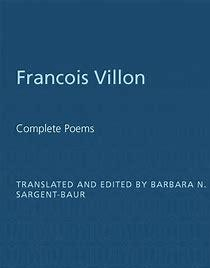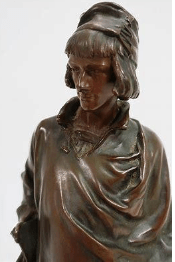This is the sixth part of Balladeer’s Blog’s look at the swashbuckling legends that surround Francois Villon (1431-1463?), remembered as one of France’s greatest poets and a notorious outlaw.
 FRANCOIS VILLON PART SIX – We pick up at the point in 1457 when the fugitive outlaw Villon found a warm and unexpected welcome in the court of Rene, Duke of Anjou. This figure was also known as “Good King Rene” because technically the crown of the Kingdom of Sicily was part of his royal inheritance.
FRANCOIS VILLON PART SIX – We pick up at the point in 1457 when the fugitive outlaw Villon found a warm and unexpected welcome in the court of Rene, Duke of Anjou. This figure was also known as “Good King Rene” because technically the crown of the Kingdom of Sicily was part of his royal inheritance.
Rene was renowned for his interest in science and literature and, despite Francois Villon’s criminal notoriety, the Duke was far more interested in the poetry Villon had churned out over the years. Some of that poetry had scandalized France, but intrigued Rene to the point where his court became a sanctuary of sorts for our man.
The Duke’s castle stood on a promontory above the confluence of the Sarth, Loir (with no e) and Mayenne Rivers, near where they poured into the Loire (with an e). The path along the land outside the castle walls was known as the Promenade of the End of the World.
In the Great Hall hung the Apocalypse Tapestry with its panels depicting scenes from the Book of Revelation. That tapestry is still available for public viewing to this day.
After enjoying the comfort and conversation of Rene’s court for a brief period, Francois returned to his life with the criminal Coquillards as a highwayman and thief.
Soon, Villon had found a more powerful quasi-patron in Charles, Duke of Orleans. Charles was a capable poet himself and ultimately left behind roughly five hundred works when he died in 1465.
Francois chafed at the company of upper crust courtiers and hangers-on at this Duke’s court, but Charles himself drove our man to focus more on his poetry than on adventuring. Many poets were part of the Duke’s court and Charles had a standing challenge to all of them to produce a work worthy of enshrinement in his loose-leaf parchment bound in leather.
 Poets unable to visit Charles’ court in Blois would send their works to him, hoping for the distinction of inclusion in the Duke’s library. Again and again during his stay, Villon presented poems for Charles’ consideration, but the Duke had recognized Francois’ unique genius and held him to a higher standard.
Poets unable to visit Charles’ court in Blois would send their works to him, hoping for the distinction of inclusion in the Duke’s library. Again and again during his stay, Villon presented poems for Charles’ consideration, but the Duke had recognized Francois’ unique genius and held him to a higher standard.
Unfortunately, Charles was uncomfortable with Villon’s deeply personal verse and the way the sentiments conveyed could leave the reader shaken. The Duke preferred more contemplative poetry of the kind that he and his fellow pampered blue bloods could afford to indulge in.
Driven by Charles’ chiding and high expectations as well as his own ego, Francois was determined to place a poem in the Duke’s personal library. At last our man produced a happy medium of his preferred style and Charles’ overclass tastes.
Unfortunately for posterity, Villon’s Blois poems which the Duke had declined to place in his book have been lost over time, but the work that won a spot in Charles’ personal volume was A Stranger in My Native Land. The Duke felt it represented the heights that Francois could reach if pushed to his limits.
In this piece, Villon had reigned in his usual fiery irreverence toward the ruling class and passionate depiction of the suffering of the poor just enough to avoid selling out. By maintaining a more generalized introspective air combined with a posh sense of ennui, our man had triumphed.
Among the lines of this poem were “A stranger in my native land/ I die of thirst where fountains spill.” As well as “All I own is this empty hand/ With goods not mine my pouches fill” and also “Naked as a worm, yet robed like a king/ I laugh in tears, in my sobbing sing/ Hope without hope, joy in despair/ I rejoice in cheerless wandering/ Repulsed and welcomed everywhere.”
 The sentiments throughout the poem reflect Villon’s self-insight. Twice within a 12-month period he had found succor in noble surroundings, but his inner iconoclast winced at the comfort and finery of such surroundings.
The sentiments throughout the poem reflect Villon’s self-insight. Twice within a 12-month period he had found succor in noble surroundings, but his inner iconoclast winced at the comfort and finery of such surroundings.
Throughout his student years, then his political rebelliousness and his life as an outlaw he thought he longed for a life of ease, but having found it in Blois, and Anjou before it, he realized how wrong he was. He had come to despise the comfort he once dreamed of.
Freedom from want had not brought Francois contentment, and he resented the fops whose company he had to tolerate. These rich and powerful people were, technically, “the enemy” that he had strived against his entire life and they were ultimately the forces that had driven him to crime and made him a fugitive.
And so, with this variation of the perennial truth that genuine enlightenment can be found only through suffering, Villon left Charles’ court shortly after producing the poem that secured his place in the Duke’s library. He returned to the pursuit of that intangible something that his life of struggle had offered.
Sentiments like this preserve Francois’ status in the romantic lore of outlawry. There’s a trace of Desperado‘s lyrics “Now it seems to me some fine things have been laid upon your table/ But you only want the ones that you can’t get” as well as the real-life Pretty Boy Floyd’s infamous decision not to flee the country to be safe from the law.
 Ironically, a few months after returning to life on the lam, Villon wound up arrested over a robbery gone wrong. Luck was with him this time and he was only briefly imprisoned in Orleans. That December, Duke Charles’ wife gave birth to another child, and the Duke celebrated by having all prisoners in his domain released.
Ironically, a few months after returning to life on the lam, Villon wound up arrested over a robbery gone wrong. Luck was with him this time and he was only briefly imprisoned in Orleans. That December, Duke Charles’ wife gave birth to another child, and the Duke celebrated by having all prisoners in his domain released.
While partying with other released prisoners Francois wrote three poems to commemorate the birth of Charles’ daughter Marie. In the future Villon would find himself in prison but would not be so fortunate. I’ll delve into that in the upcoming chapter.
